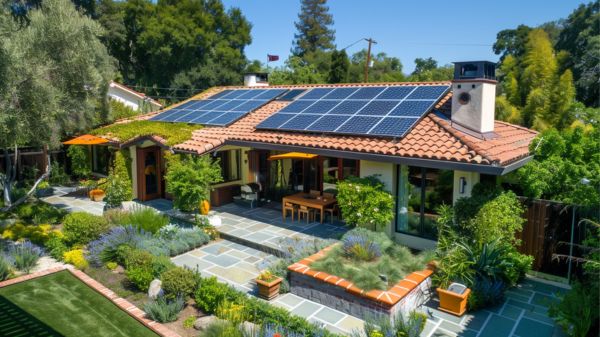Hey there! Have you ever wondered about the pros and cons of renewable energy? Well, you’re in luck because we’re here to break it down for you.
Renewable energy, like wind and solar power, is the way of the future. It’s like having a never-ending supply of clean, green energy right at our fingertips.
On the positive side, these energy sources won’t run out, save us money, and help protect our environment. Plus, they reduce our dependence on foreign energy sources.
However, there are some drawbacks to consider. Upfront costs can be high, and there are limitations when it comes to storage and reliability.
But don’t worry, despite these challenges, renewable energy is crucial in tackling climate change and building a sustainable future.
Let’s dive in and understand the pros and cons together!
Advantages of Renewable Energy
Renewable energy offers numerous benefits that contribute to a more sustainable and resilient future for all of us.
One of the main advantages of renewable energy is that it’s a clean energy source, meaning it has a low carbon footprint and lower carbon emissions compared to fossil fuels. Solar panels and wind turbines, for example, harness the power of the sun and wind to generate electricity without producing harmful greenhouse gases. This not only helps combat climate change but also reduces air pollution, leading to improved air quality and better respiratory health for communities.
Additionally, renewable energy sources don’t deplete natural resources and provide a continuous and reliable power supply. These advantages make renewable energy a viable and responsible choice for meeting our energy needs while protecting the environment for future generations.
Disadvantages of Renewable Energy
While there are many advantages to renewable energy, it’s important to also consider the potential drawbacks. Here are some of the cons of renewable energy:
- Intermittency: Renewable energy sources like solar panels and wind turbines depend on weather conditions, making the energy supply inconsistent. This can be a challenge when demand for electricity is high.
- Geographical limitations: Not all areas have the same potential for renewable energy generation. For example, solar energy may not be as efficient in regions with limited sunlight. This can limit the widespread adoption of renewable energy.
- Upfront costs: The initial investment for setting up renewable energy infrastructure, such as installing solar panels or wind turbines, can be substantial. This can deter some individuals and businesses from transitioning to renewable energy.
- Maintenance and storage: Renewable energy systems require regular maintenance and often lack efficient storage capabilities. Additionally, energy storage technologies can be expensive and may not always be able to meet the demand.
While renewable energy offers many benefits, these disadvantages must be taken into consideration when evaluating its overall impact on the environment and energy sector.
Types of Renewable Energy Sources
Moving on from the disadvantages of renewable energy, let’s now explore the various types of renewable energy sources available.
The renewable energy sector offers a range of options to generate clean and sustainable power. Wind power, for example, utilizes wind turbines to convert the kinetic energy of the wind into electricity. Solar power, on the other hand, harnesses energy from the sun through the use of solar panels.
Both wind power and solar power offer significant advantages over fossil fuels, including reduced carbon dioxide emissions and a virtually unlimited supply of renewable power sources.
Biomass energy, derived from organic matter such as plants and waste products, is another form of renewable energy that can be used to produce heat, electricity, and even fuel.
Additionally, nuclear energy, although controversial, is considered a low-carbon source of power and can contribute to reducing greenhouse gas emissions.
Environmental Benefits of Renewable Energy
To fully appreciate the positive impact of renewable energy, we must acknowledge the significant environmental benefits it brings. Here are four key environmental benefits of renewable energy:
- Reduced greenhouse gas emissions: Renewable energy sources, such as solar panels and wind turbines, produce electricity without emitting harmful greenhouse gases. This helps combat climate change and reduces our reliance on fossil fuels, which are major contributors to global warming.
- Improved air and water quality: Unlike traditional power plants that burn fossil fuels, renewable energy sources don’t release pollutants into the air or water. This means cleaner air to breathe and healthier ecosystems for plants and wildlife.
- Minimized ecosystem disruption: Extracting and burning fossil fuels often leads to habitat destruction and ecosystem disruption. By transitioning to renewable energy, we can reduce the negative impact on natural habitats and protect biodiversity.
- Sustainable energy production: Renewable energy sources are infinite and can be replenished naturally. This means we can continue to generate electricity without depleting finite resources, ensuring a more sustainable future.
Job Creation and Economic Impact of Renewable Energy
Renewable energy not only provides significant environmental benefits, but it also plays a crucial role in job creation and has a positive economic impact.
The shift towards renewable energy sources, such as wind turbines and solar panels, has led to the creation of numerous job opportunities in the renewable energy sector. According to studies, renewable energy creates more jobs compared to fossil fuels. These jobs range from manufacturing and installation to maintenance and operation of renewable energy systems.
Moreover, the economic impact of renewable energy extends beyond job creation. It reduces reliance on imported energy, enhancing economic independence. Additionally, the use of renewable energy reduces greenhouse gas emissions, improving public health and the environment. It also provides cost savings through lower operating costs and financial incentives and tax credits.
Countries that prioritize renewable energy experience fewer blackouts, making the power grid more reliable. Overall, the job creation and economic impact of renewable energy make it a promising alternative for power generation.
Conclusion
Renewable energy offers numerous advantages such as unlimited supply, cost savings, and environmental benefits. However, it also comes with disadvantages like high upfront costs and intermittent availability.
Despite these drawbacks, renewable energy is crucial in combating climate change and creating a sustainable energy future. As the saying goes, ‘Every little bit helps,’ and embracing renewable energy sources is a small but significant step towards a greener and more sustainable world.



